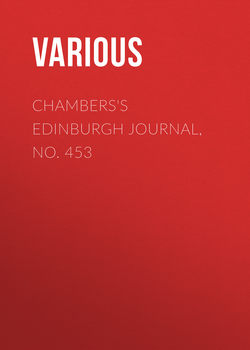Chambers's Edinburgh Journal, No. 453

Реклама. ООО «ЛитРес», ИНН: 7719571260.
Оглавление
Various. Chambers's Edinburgh Journal, No. 453
A POSSIBLE EVENT
BARTHOLD GEORGE NIEBUHR
THE TATTLETON ELECTION
SAILORS' HOMES
UNCLE TOM'S CABIN
STORY OF ELIZA
FORTUNES OF A LITERARY GOLD-SEEKER
LACON'S BOAT-LOWERING APPARATUS
IGNORANCE THE GREAT CAUSE OF POVERTY
A WEE BIT NAME
Отрывок из книги
We have been reading with profound interest the life and letters of one of the great men of Germany, Barthold Niebuhr, published very recently in an English garb.1 The original work we have not seen, but we understand it is about one-third larger than the present selection, made in a great measure under the auspices of the Chevalier Bunsen, the friend of Niebuhr, and his immediate successor in the Prussian embassy to Rome. The interest of the book is, indeed, principally derived from the private letters of Niebuhr, the greater part of which were addressed to his early friend, Mme Hensler, whose younger sister was his first wife, and her niece his second. Most unfortunately, the valuable series of his letters to his father was destroyed by fire a short time before his own death; but the account given of him by Mme Hensler is quite sufficient to connect all that remains; and from this, and one or two other sources open to us, we shall try to fill up our present narrative.
Niebuhr is one of those men whose advent forms an era in the history of human knowledge. It is a mistake, however, to suppose that he was the first to infuse even into Roman story that element of doubt which has changed the whole fabric of historical science. If Niebuhr was a mere sceptic, he would be only the humble follower of Bayle, Lesurgnes de Pouilly, and other writers of the last century; but his merit lies in reconstruction—in the jealous care with which he distinguishes between the true monuments of history and the mass of traditional rubbish in which they lay entombed. In his Roman history, however, although by that alone he is known in England, we find only a portion of the intellectual man: he was learned in the learning of all times, modern as well as ancient; and yet he was so completely immersed, not merely as an observer, but as a participator, in the business of the world and the great events of his own time, that even literature seems to have been little more than a study indulged in during the pauses of active life. The history of a mind so vast is by no means, we are aware, adapted for pages like ours; and yet it seems important—indeed indispensable—that in a popular journal, flowing on with the spirit of the age, we should trace some authentic records of the character and career of the man.
.....
His interest in politics dated from a very early period. At the age of eleven, he studied the newspapers, English ones especially, which he read with ease; and his knowledge of geography enabled him to follow all the details of a campaign with vivid interest.
His going to the university was an important incident in his life. His particular vocation, indeed, seems to have been clear enough from even an earlier period; for though he was a learned linguist, history especially, and philology, were the pursuits to which his heart was given. The letters he wrote from Kiel to his parents are amiable, full of affectionate outpourings about the new men and women to whom he was introduced, about his studies, and about his theories. He profits by the kindness of the physician, Dr Hensler, whose house and friendly advice were always accessible; but he declines evening-parties; and contemplates the mountain of knowledge, up whose steep sides he has yet to climb, with profound awe and some anxiety. 'My head swims when I survey what I have yet to learn—philosophy, mathematics, physics, chemistry, natural history. Then, too, I must perfect myself in history, German, and French; study Roman law, and the political constitutions of Europe, as far as I can, &c.; and all this must be done within five years at most.... I must know all these things; but how I shall learn them, Heaven knows! That I shall require them as a learned man, or in any position I may occupy, I am fully convinced.'
.....